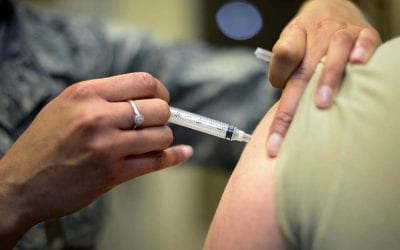
When critics like me call the Transporation Security Administration (TSA) procedures at airports good theater, our definition is a bit different than TSA’s. TSA’s approach at airport security checkpoints, and gates, is to consider them military theaters, and consider everyone going past them, “the enemy.”
TSA doesn’t differentiate between friend and foe. They are just as likely to pull aside an 85 year old grandmother on her way to Florida, as a real terrorist.
When I talk about TSA theater, I’m talking about all show and no substance. I’m talking about drama and over-acting, unnecessary exaggeration, and little security for travelers to show for it.Primarily in reaction to the Christmas Day, 2009 bombing attempt on Northwest Flight 253, TSA has begun a program of swabbing passengers’ hands, to determine if any of them are terrorists who have recently handled explosives.
In the past, screeners swabbed random carry-on luggage and other objects from among the millions and millions carried aboard each year, as they searched for the proverbial needle in the security haystack; an explosive to be carried on board an airplane.
Now TSA has moved its explosive detection to passengers’ hands, to find the same needle. To do that, TSA is randomly swabbing passengers’ hands at airport checkpoints and gates.
Some security experts have hailed passengers’ hands swabbing for explosives as a step in the right direction. Security expert Tony Fainberg says, referring to the current procedure of swabbing luggage handles and parts of bags that were likely contaminated by human hands, “Looking at the hands means you will probably get a better dose [of explosive residue].” While that’s true, I believe Mr. Fainberg and the others who have called this good security, have missed important points.
We know what TSA “expects” to possibly find by their random testing, but is it what they will find? I’m wondering how likely it will be that a random testing program will actually find a terrorist or their explosive. Isn’t it just as likely, or perhaps more likely, that a terrorist won’t be caught by a random testing program than will be caught? While I’m no statistician, I’ve had lots of mathematics courses, and it sure seems that way to me.
I’ve done some research into explosives, especially nitro-compound explosives. It turns out they’re “sticky,” meaning once on you, they are tough to wash off.
Explosives Trace Detection (ETD) equipment, which TSA is using to analyze hand and luggage swabs, are capable of detecting explosive residues as tiny as a nanogram (billionth of a gram). A bomb maker could wash incessantly and even dry-clean their clothes and still ETD equipment can catch them.
That being said, who are the passengers that TSA will likely detect by their random swabbing program. They will include summer campers going home who’ve participated in target shooting, Olympic biathalon competitors, gardeners and farmers who fertilize their plants and crops, people using many anti-dandraff shampoos, and many seniors and others, who carry around nitroglycerine, a common heart medication.
The American Civil Liberties Union (ACLU) has stated they’ve “always supported explosive detection as a good form of security that doesn’t really invade privacy,” according to spokesperson Jay Stanley. The problem with the ACLU position is they are concerned with discrimination, not with security. They seem to be missing important points.
I agree with the ACLU about discrimination. I’m against profiling, using race, ethnicity, national origin, or religion in selecting passengers for searches; body or belongings. They’re against it solely because it’s discriminatory, and I’m against it because it doesn’t work as a security tool.
Think about it this way. Let’s say the federal government pulls aside every Middle Eastern looking person at the airport for extra screening. How many terrorists do you think they will catch? Any? Do you think a strategy like that would have caught terrorists like Timothy McVeigh, or Terry Nichols?
I think TSA might take a lesson from how the police prevent crime.
Good cops look for something out of place, or a person with an attribute or attitude which “doesn’t click.” It could be as simple as someone approaching a cop who’s acting nervously. It might be sweaty palms or shifty eyes when the person is asked simple direct questions. Trained interrogators know how to read the signs people put out.
Once they think something’s odd or wrong, they pull the person aside. They search them and their belongings, they ask more questions, and more times than not, they find a criminal.
It’s called psychological profiling, and it works. Ask the police, and ask El Al. They’ve all been using this method of detecting criminals and terrorists for years.
I’ve said earlier TSA, security experts, and the ACLU have all missed important points.
They’ve missed the point that random testing is just not likely to uncover a terrorist, but it is likely to trap and humilate grandparents, and senior citizens by the thousands, daily. It’s going to catch home gardeners every spring. It’s even going to catch people trying to rid their heads of those embarrassing white flakes showing up on their dark clothing.
They missed the point that all those electronic, wiz-bang tools aren’t as good as old fashioned quality police work.
If TSA really wants to make us safer and more secure, they need to spend their dollars, not on the latest gadget, but on educated, highly trained agents.
After many years working in corporate America as a chemical engineer, executive and eventually CFO of a multinational manufacturer, Ned founded a tech consulting company and later restarted NSL Photography, his photography business. Before entering the corporate world, Ned worked as a Public Health Engineer for the Philadelphia Department of Public Health. As a well known corporate, travel and wildlife photographer, Ned travels the world writing about travel and photography, as well as running photography workshops, seminars and photowalks. Visit Ned’s Photography Blog and Galleries.

